- Home
- Jean Stone
A Vineyard Christmas Page 6
A Vineyard Christmas Read online
Page 6
“No. I’ve been too worried I’d run into Earl.”
“Right. But I have a thought.”
Annie had put the sleeping baby back into the basket, which she now nervously rocked.
“You said the girl at the fair was young. How young?”
“I have no idea. Maybe seventeen. Eighteen. I have no one to compare her with.”
Winnie broke into a smile. “Well, we might. Lucas, my brother Orrin’s boy, just turned nineteen. If that little baby’s mother lives on the island, chances are they were in school together.”
“But you’re way up here. A long way from Edgartown.”
“There’s only one public high school. And there’s the charter school. Lucas went to the public one.”
“The big one on Edgartown-Vineyard Haven Road?”
“Yes. I think they have several hundred students. The charter school, a lot fewer. But Lucas would probably know her. Most of the kids know each other if only by sight, even if they’re not in the same class. There are so many activities, it seems like sooner or later, they run into one another. Anyway, he’s home from college on winter break.”
“That’s great, but I wouldn’t want to tell him why I’m trying to find her. I have a strong feeling that she’s an unwed mother.” Annie didn’t know if that term was still used; it always made her think about Donna MacNeish, the woman who’d given birth to her so many years ago. “If Bella’s father is an island boy, I don’t want to go public with information that isn’t mine to share.”
“I agree. But we can look in the yearbook. Lucas must have one. He graduated last year.”
Annie rocked the basket a little more. “Well . . . I only saw her briefly . . . but Bella has her mother’s dark hair and her sad, soulful eyes,” she said. “Even at her age, there’s a striking similarity between them.”
“Good. That’s a place to start.” She signaled her toward the hall. “We have enough bookshelves in the living room to start a library. Sooner or later, all our books wind up there. Let’s check it out before the clan gets home.”
Sometimes, when least expected, Annie’s heart could start to race as if something—or someone—had triggered an internal panic alarm. She didn’t know why this was one of those times; she only knew that when she stood up, her heart pounded as hard as it had the night Bella had arrived. But, as she wrapped her sweater tightly around her and picked up the basket, she heard herself say, “Okay. Lead the way.”
* * *
The living room was enormous. The focal point was a wide fireplace that was beautifully crafted from the same brick as Winnie’s kiln and a mantel that looked like it had been hewn from the same wood as the table.
“When I was a kid, this room didn’t exist,” Winnie said. “We all lived in the kitchen. My parents’ bedroom was downstairs where I sleep now; there was only one real bedroom upstairs; my brothers slept there. My room was the storage closet at the top of the stairs. It didn’t have a window, but I could close the door and get away from them.” She said it matter-of-factly. “Now we have this wonderful room and a few more people. But everybody still likes to hang out in the kitchen.” She laughed. “I guess it’s like that in most families.”
“I guess,” Annie said with her practiced smile. Then her eyes traveled around the room: one long wall held shelves and shelves of magnificent pottery—pitchers, mugs, and dishes of all sizes. Some of the pieces were wheel-thrown, kiln-fired, and glazed with soft shades the colors of sea glass; others were more fragile pinch pottery, crafted from clay that had been shaped and pounded, then dried by hand, revealing vivid earth tones in reds and golds, and browns and grays—colors that had been hidden within the clay. Winnie once told her that if those pieces were fired they would lose their radiance.
“I’m working on my collection for the spring fair,” Winnie said. “It’s hard to believe with all the snow outside, but it will be here soon enough.”
The distraction helped ease Annie’s anxiety. “And your jewelry pieces are for the fall shows?”
“Right. I hate working around the kiln in summer. Too hot!” She laughed again. “Which reminds me. That baby’s basket looks like the ones that Nancy Clieg makes.Was she selling them at the fair?”
Annie scowled. “I have no idea.” She’d been so busy trying to look relaxed, she sadly hadn’t noticed any of the other vendors.
Stooping down, Winnie examined it. “I can’t be sure, but it sure looks like one of Nancy’s.”
“Do you know her?”
“She lives over in Menemsha. I’d go see her for you, but . . . well, we once had an issue over a piece of land, and let’s leave it at that. But I’ll give you her address before you leave. Maybe she’ll remember if Bella’s mother bought it.” She turned and gestured toward the opposite wall, which was about thirty feet long and had shelves stuffed with books, floor to ceiling. A ladder was on one end: it was attached to a row of tracks that spanned the whole length of the wall. Winnie grinned. “Welcome to our library.”
“Wow. You weren’t kidding.”
“We might even have one or two of your volumes in there. My sister-in-law is a big fan. Now let’s get to work. I’ll tackle the top; you start on the bottom. You’re younger than I am, so you probably can squat without falling over.”
Annie doubted that Winnie had ever “fallen over.” But she was grateful for the help and the companionship. Not to mention that she felt as if she were in heaven when faced with all the wondrous volumes. A quick scan said it all: novels, histories, biographies, politics, and on and on—indeed, a veritable library. She moved to the far end of the wall, crouched, and got to work.
* * *
Nearly two hours had elapsed without a single sighting of a high school yearbook when the front door opened and footsteps clamored into the hall. Voices yammered, boots clunked onto the floor, long zippers could be heard gliding down crinkling nylon parkas. The silence had been broken.
“Food!” someone shouted.
Bella let out a wail.
“They’re back,” Winnie groaned. She climbed down from the ladder. “Sorry we haven’t had any luck. You’ll stay for lunch? It’s long past time to eat.”
They returned to the kitchen, where Annie was greeted with an assemblage of faces, which, like Bella’s and her mother’s, resembled one another. Annie wondered, not for the first time, if she, too, resembled her birth family.
Winnie quickly introduced the five adults who’d crammed into the kitchen: a teacher, a nurse, a carpenter, Winnie’s brother the fisherman, and Lucas—the college student who might know the missing mother.
“You left the kids at story time?” Winnie asked.
“Yup,” the son-in-law, the carpenter, replied. “They’ll be done at four. I gave them lunch in the car. Sandwiches from The Food Truck in Menemsha.”
“You stopped at Orange Peel?”
“Yup. Three loaves of multigrain, as ordered.”
The Orange Peel Bakery had become the go-to destination for breads and cookies crafted from nature’s ingredients and baked in an outdoor oven; its tasty products had received kudos even from the New York Times.
“I’ll heat the chowder from last night,” Winnie’s daughter announced. “Then it’s every man for himself.” She was the teacher and clearly knew how to take charge. Annie recognized that as a trait from her former life; she also knew she could not turn down chowder and Orange Peel’s multigrain.
“And I’ll get the baby changed,” Winnie announced, then whisked Bella from the basket, grabbed the bag of things Annie had bought, and disappeared into another room.
“Sweet baby,” the daughter said. “Beautiful eyes. Adorable dimple. Yours?”
“I wish,” Annie replied. “I’m sitting for a friend.” Congratulating herself for her fast thinking, she stepped past the men and began to help set the table.
“You’re the writer, aren’t you?” Winnie’s sister-in-law, the nurse, asked. She was a good deal younger than Winnie’s brother
; their marriage was his second.
“I am.”
“Working on a new book?”
“Always.” Then she had a thought. “In fact, Winnie’s helping me with some research.” She turned to Lucas. “You graduated from the island high school, didn’t you?” The boy nodded. “Do you have a yearbook? I’m trying to get a quick picture of the inside of the school—the classrooms, the activities—and looking at a yearbook would really help.” A white lie might turn out to be kinder than the truth.
“Sure,” he said. “Got one in my room. Somewhere.” He put his hands into the pockets of his sweatshirt.
His mother looked at him. “Maybe you’d like to go find it for Annie?”
“Oh,” he said, “sure. I think it’s in my closet.”
Annie finished setting the table, while the others found their places and sat down.
With the happy commotion around her, by the time they’d finished eating, Annie still hadn’t checked the yearbook that Lucas had set beside her. And it was nearly dark.
“You and the baby will stay here tonight,” Winnie announced. “It’s too late for you to head back to Chappy. The roads will be slick and hard to see. Dangerous. We’ll set you up with an air mattress in the living room. Tomorrow, you can go home by way of Menemsha and pay a visit to Nancy Clieg. Tonight, you can help us decorate the tree—we might or might not have enough lights and ornaments for whatever monstrosity they came home with this year. Then we’ll all play rummy. It’s our Saturday night tradition.”
It was a wonderful way to end a wonderful day: Annie felt as if she’d known the Lathrop family for years. When Winnie’s son-in-law won the last round of rummy—“He always does,” his wife complained—everyone, except Winnie and Annie went to bed. Winnie collected remnants of the tree decorations while Annie sat by the fireplace and pored over the yearbook. But page after page of senior photos yielded no one who looked remotely like Bella’s mother. Nor did any of the students in the group shots of underclass kids. It was a dead end.
“I will not allow you to get discouraged,” Winnie said. “When the time is right, you will know what you need to know.”
With the last of the evening’s tea gone, Annie checked on Bella, who was sleeping peacefully in her basket. Then she lay down on the air mattress that they’d set next to her. “Good night, Winnie,” she said. “Thank you for everything.”
Winnie turned off the twinkling tree and whispered into the darkness, “Good night, Annie Sutton. And for your information, you would have made a fine mother. You already love a baby you don’t even know.”
Annie closed her eyes, let Winnie’s words sink in, and tried not to feel the old, familiar ache sneak back into her heart.
* * *
Frozen with fear.
A long time ago, when she was thirteen, Francine had sat in the movies with Jason Arroyo, whom her grandfather would have shot if he’d known they were together because he was from Puerto Rico and therefore, according to Gramps, was not their kind. In truth, he probably would have shot both of them. It wasn’t as if they were going to get married, but if they were, Francine knew they’d have to run away.
She’d really liked Jason. He had held her hand while they watched the previews of the coming attractions. One was for a real scary movie. She didn’t remember the plot, only the terrifying music playing—loud—in the background while the title slashed over the screen: Frozen in Fear.
That was how she felt now. When it was three o’clock in the morning and Annie Sutton still hadn’t gotten home with or without Bella, and Francine couldn’t move because she was so scared.
Jason had moved away before the end of that school year, and Francine never heard from him again. But she wished he were there now to hold her hand.
Chapter 7
The morning was cloudy, but the temperature was warmer; the forecast promised some melting on the icy roads.
After a hearty breakfast of fresh farm eggs and cranberry scones, Annie bundled the baby once again and carefully set the basket in the car. She made sure Bella was facing her: Annie enjoyed glancing over at the baby, hoping to be rewarded by one of her sweet, small smiles.
“Keep me posted,” Winnie said, tucking a bag of scones into Annie’s bag. “If you need me, you know where I am. And good luck with Nancy.”
Annie thanked her again, waved, and drove off. Because GPS wasn’t dependable up island, she’d written the directions to Nancy Clieg’s house in the small notebook she kept in her purse—a writer’s habit, so she was always ready to jot down a tidbit or two. The notebook now rested, open, on the passenger seat. With any luck, Annie would finally find one piece of the puzzle.
Following South Road to Beetlebung Corner, she turned at the old white church onto Menemsha Cross Road—a narrow country lane that wound through tall, lichen-coated oak trees and what looked like ancient pathways. At North Road, she went left, then found the turnoff that led to Nancy’s cottage. Like many island homes, it featured a “peek” of the harbor; true waterfront properties seemed reserved for family homesteads that went back many generations or for seasonal people with unlimited resources.
Annie parked and carried Bella up the front walk. She crossed her fingers as she knocked.
Nancy greeted her with a raised eyebrow and a suspicious expression. She had tangled gray hair and deep lines at the corners of her mouth and eyes that spoke of years of close concentration.
“I heard you make beautiful baskets,” Annie said. “I’m trying to find out if you sold this one at the fair.”
In less than a second, the woman shook her head. “Fake,” she said, her small eyes darkening. “Christ. People steal everybody’s ideas nowadays. They think they can make a buck the easy way.”
Annie was dumbstruck. Whatever she might have thought Nancy would say, it certainly wasn’t that.
“Look at this,” Nancy grunted, then pointed to the edge where the handle met the basket. “It’s a piece of crap. I’d be ashamed to take money for a job like that. You’d best not keep that baby in there when she gets much bigger. That handle’s going to give out.”
Thinking quickly, Annie said, “I’m not surprised. I showed it to Winnie Lathrop, but she didn’t think it was up to your standards.” The woman wouldn’t know it was a lie; Annie felt it never hurt to try to spread goodwill. “But do you know who made this . . . fake? If it was someone on the island?”
“Not if they know me. And most people do. Nope. More than likely, it’s someone on the Cape. I heard there were copycats in a souvenir shop in Provincetown.” She shook her head. “Yup. Piece of crap. Now if you’ll excuse me, my breakfast is on the stove.” The door started to close.
“Wait!” Annie cried, tightening her grip on the basket that might give out at any time and send Bella somersaulting down the hill toward the Coast Guard station in the harbor. “Do you have any of your baskets here? Can I buy one?”
The door stayed half-open. Nancy scowled again and said, “You have cash? Eighty-five dollars. That’s a discount. I sold them for a hundred at the fair.”
* * *
It was just past noon when Annie and Bella—safely in her brand-new basket, the old one tossed haphazardly into the back seat—made it to the On Time. The Lexus was fifth in line, an anomaly for late December, when lone vehicles crossing on the ferry were common. But it was a beautiful Sunday, and last-minute shoppers no doubt had scuttled off Chappy to finish their holiday shopping.
Parked behind an SUV that blocked her view of the harbor, Annie closed her eyes and wondered if she should get Bella a gift. Nothing big, of course. Nothing . . . permanent. Or costly. Nothing that might be misinterpreted as an attempt to claim the baby as her own. But if they were still together Christmas morning, it would be nice to mark the occasion with a visit from Santa.
With her thoughts drifting to what she could give her, the last thing Annie expected was a loud rap on her window. She jumped. Her eyes sprang open. And, of course, Bella let out a screech.
A woman stood on the passenger side—Bella’s side—of the car. Her face was so close it was nearly pressed onto the glass. She had white, flyaway hair, startling pearl-gray eyes, and a thousand lines etched across her fair skin. She stared inside the car and rapped again.
Annie knew she had to respond. She turned the key in the ignition and lightly touched the power button, opening the window only a few inches.
“Hello?” she asked.
The woman scrunched her face, deepening the thousand lines. “Annie Sutton?”
Oh, God, Annie thought. Not another book fan. She smiled. “Yes. How may I help you?”
Luckily, the SUV in front of her inched forward. The On Time must have arrived, the vehicles must have disembarked, and the first three in line must have moved onto the flatbed for the next journey across the channel, which would last less than two minutes. Annie knew if she didn’t pull up behind the SUV, the driver behind her would get justifiably annoyed.
She pointed toward the ferry, then shifted the Lexus into drive. Unfortunately, the intruder skipped along next to her.
“You’re renting the Flanagan place?”
“Yes.” There was no point denying something she apparently already knew.
Then the woman’s hand squeezed into the four-inch gap. Annie resisted the urge to push the power button up. Instead, she stopped the car, tapped the button down, reached across the passenger seat, and extended her hand. The woman shook it and smiled. Then her pearl-gray eyes dropped down to the basket. “Cute baby. Yours?”
Annie’s heart quickly thumped into its warning mode. “No. I’m babysitting for a friend.”
“Someone in Edgartown?”
Her thoughts flickered like the twinkling lights on the Christmas tree at Winnie’s. If the woman was headed back to Chappy, chances were she knew everyone there—Earl had told her the population was less than two hundred year-round. Chances also were that the woman would know Bella did not belong there—if, in fact, she didn’t. And, with Annie’s luck, she might also know everyone in Edgartown. So Annie simply said, “No. She lives up island.”

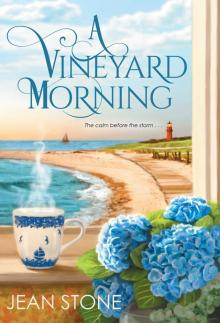 A Vineyard Morning
A Vineyard Morning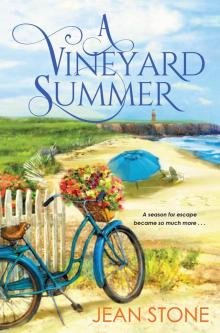 A Vineyard Summer
A Vineyard Summer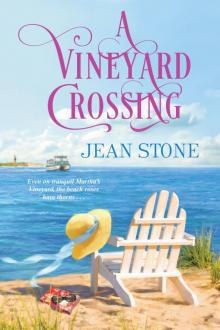 A Vineyard Crossing
A Vineyard Crossing A Vineyard Christmas
A Vineyard Christmas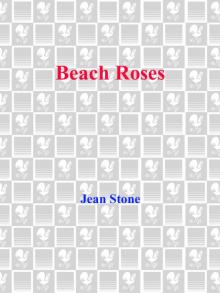 Beach Roses
Beach Roses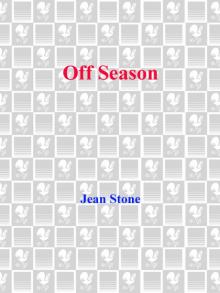 Off Season
Off Season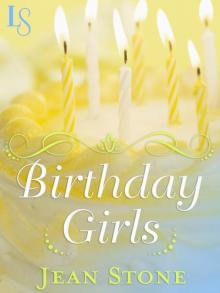 Birthday Girls
Birthday Girls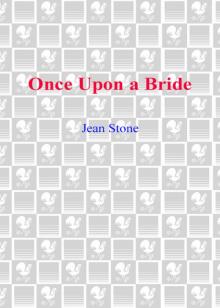 Once Upon a Bride
Once Upon a Bride Places by the Sea
Places by the Sea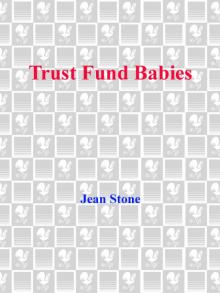 Trust Fund Babies
Trust Fund Babies The Summer House
The Summer House Tides of the Heart
Tides of the Heart Sins of Innocence
Sins of Innocence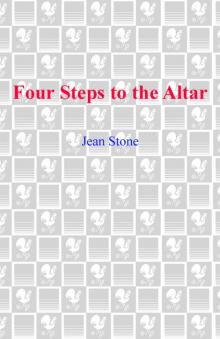 Four Steps to the Altar
Four Steps to the Altar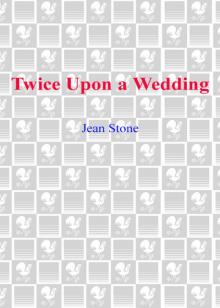 Twice Upon a Wedding
Twice Upon a Wedding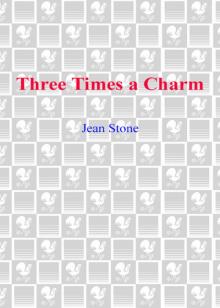 Three Times a Charm
Three Times a Charm